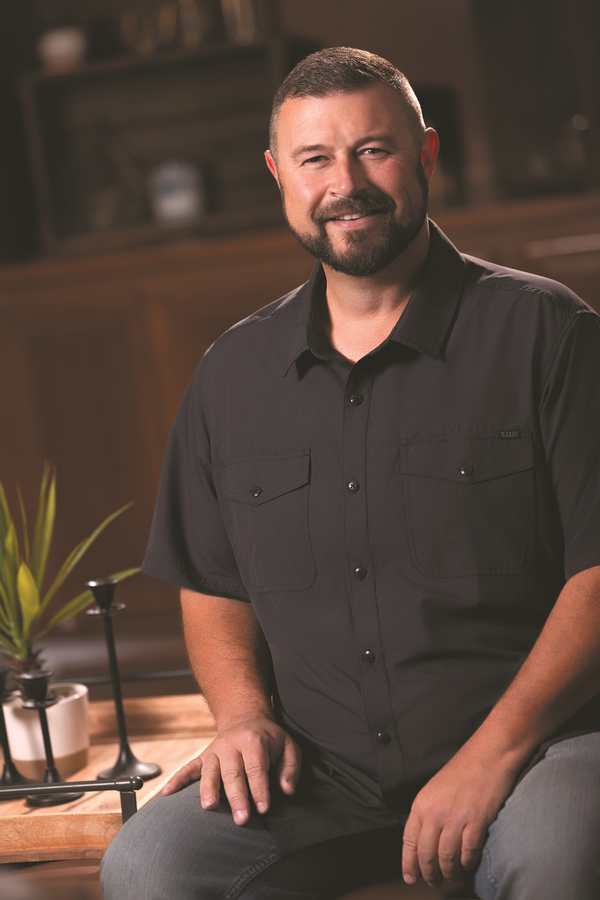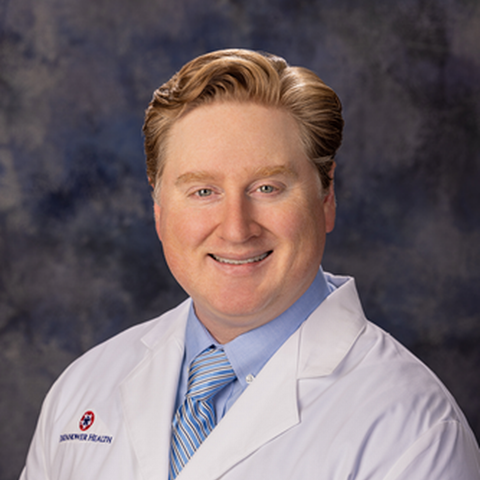Pulsed Electric Field Ablation

“I dealt with all that, including a couple of years of hard-core depression,” admits the married father of three. “I was free of cancer for about five years. Then, as part of a regular follow-up last year, a CT scan showed a spot on my left lung.”
A biopsy revealed that it was metastasis: his rectal cancer had spread to his lung.
“I had more chemotherapy and was scheduled for surgery to have half of my left lung taken out as well as additional radiation,” Casman relates. “Then, on the Saturday before my surgery, Dr. Thomas called me and said, ‘Hold off on that surgery. Let’s try ablation first. If it doesn’t work, there’s still time to do surgery and radiation.’”
Justin Thomas, MD, is a Board Certified Interventional Pulmonologist specializing in minimally invasive procedures for diagnosing and treating lung cancer, benign and malignant airway disease, and diffuse lung diseases. He is also Board Certified in Pulmonary Disease, Critical Care Medicine and Internal Medicine.
The ablation procedure Dr. Thomas referred to is pulsed electric field (PEF) ablation. Unlike radiofrequency ablation or cryoablation, which use heat or cold to kill cancer cells, PEF uses high-voltage electrical pulses to selectively target cancer cells while minimizing damage to surrounding healthy tissue. To treat cancerous lung nodules (either primary or metastatic), PEF is performed using a thin, flexible tube (bronchoscope) inserted into the lungs.
Pulsed electric field ablation can also be used to treat head and neck, renal cell, colon, breast, squamous, adenoma, sarcoma and carcinoid tumors, and Eisenhower is among the first hospitals in the nation to offer it. PEF is used for treatment of all solid cancers. Generally, it is used for patients who have had progressive disease despite treatment with chemotherapy/immunotherapy, recurrent widespread disease, or patients with early-stage cancer who have no other options, such as surgery or radiation.

The recommendation to use this leading-edge technique was guided by Eisenhower’s tumor board, a group of medical experts who meet to discuss and review complex cancer cases to determine the best treatment options for patients. This collaborative approach includes specialists from various fields, including medical oncology, surgery, radiation therapy and, in Casman’s case, pulmonology.
Casman underwent PEF on an outpatient basis in August 2024.
“I went into the hospital, had the procedure and, after I recovered from anesthesia, I went home,” he says. “This was on a Friday, and I was back at work on Monday,” he adds, referring to his job driving an 18-wheeler to deliver heavy equipment.
Three months later, a repeat CT scan revealed that the metastatic nodule in his left lung was completely gone. Nine months out, he was still doing well.
“Mr. Casman had a 100% response to the ablation,” Dr. Thomas says. “I’ve treated about 50 patients so far and nearly 80% of them have had a disease-control response - from stabilization to partial or complete response like Mr. Casman.
“PEF is really an amazing technology,” he continues. “Without it, many cancer patients otherwise would go on to hospice. In Mr. Casman’s case, he avoided a big surgery with a long recovery, and the risk of radiation-induced pneumonitis (inflammation of the lungs that can occur after radiation therapy to the chest). And, because PEF can be performed with no other tissue destruction, it can be done near critical structures like the heart or esophagus.”
“Equally important, PEF can be repeated multiple times,” Dr. Thomas adds, noting that other forms of ablation can’t be repeated because they destroy too much normal tissue. So, should Casman’s metastatic disease recur, he can undergo PEF again.
“This has given me tremendous peace of mind,” Casman says.
“This type of ablation was an awesome choice for me,” he continues. “Cancer can be devastating, and it messes with your outlook on life and your plans for the future. But you learn to live around it.
“I try to stay positive,” he adds, crediting his wife and his belief in Jesus for that outlook. “And knowing my doctors at Eisenhower are there for me means so much.”
For more information about the Eisenhower Health Lung Cancer Screening Program,
visit EisenhowerHealth.org/Lung.



